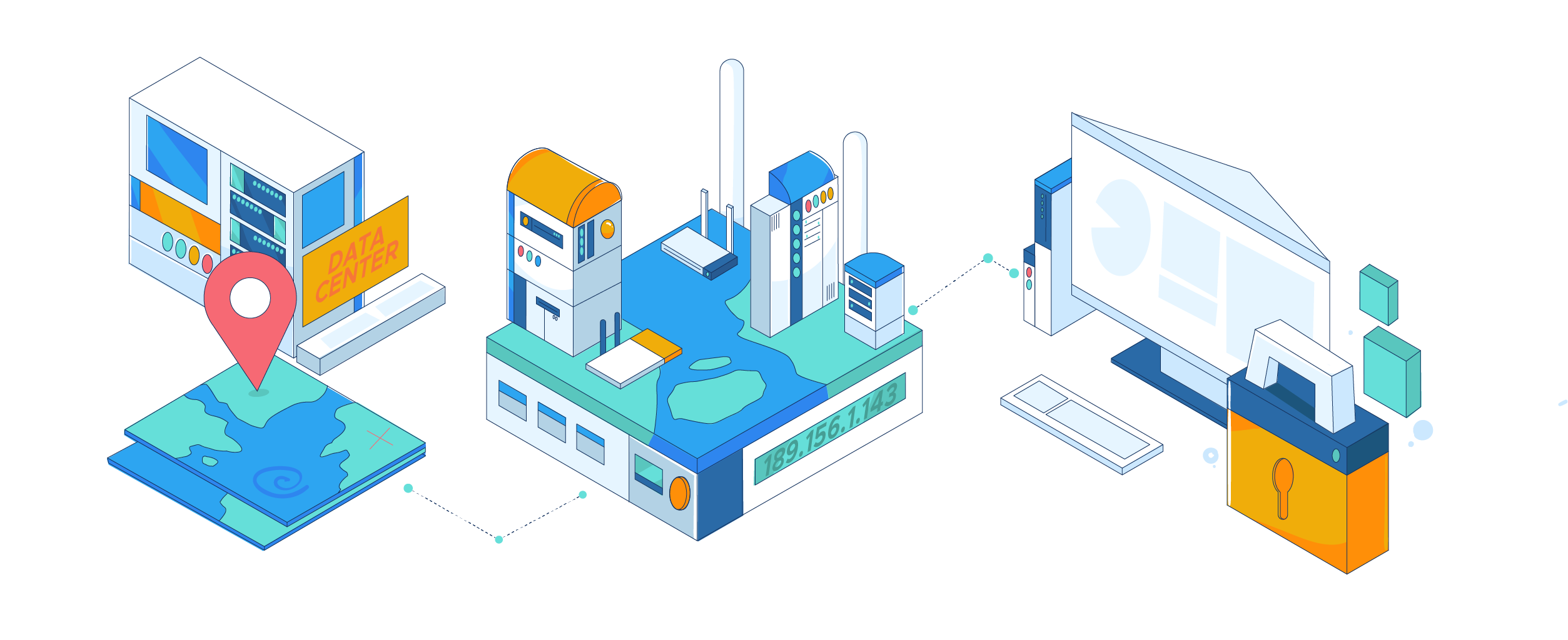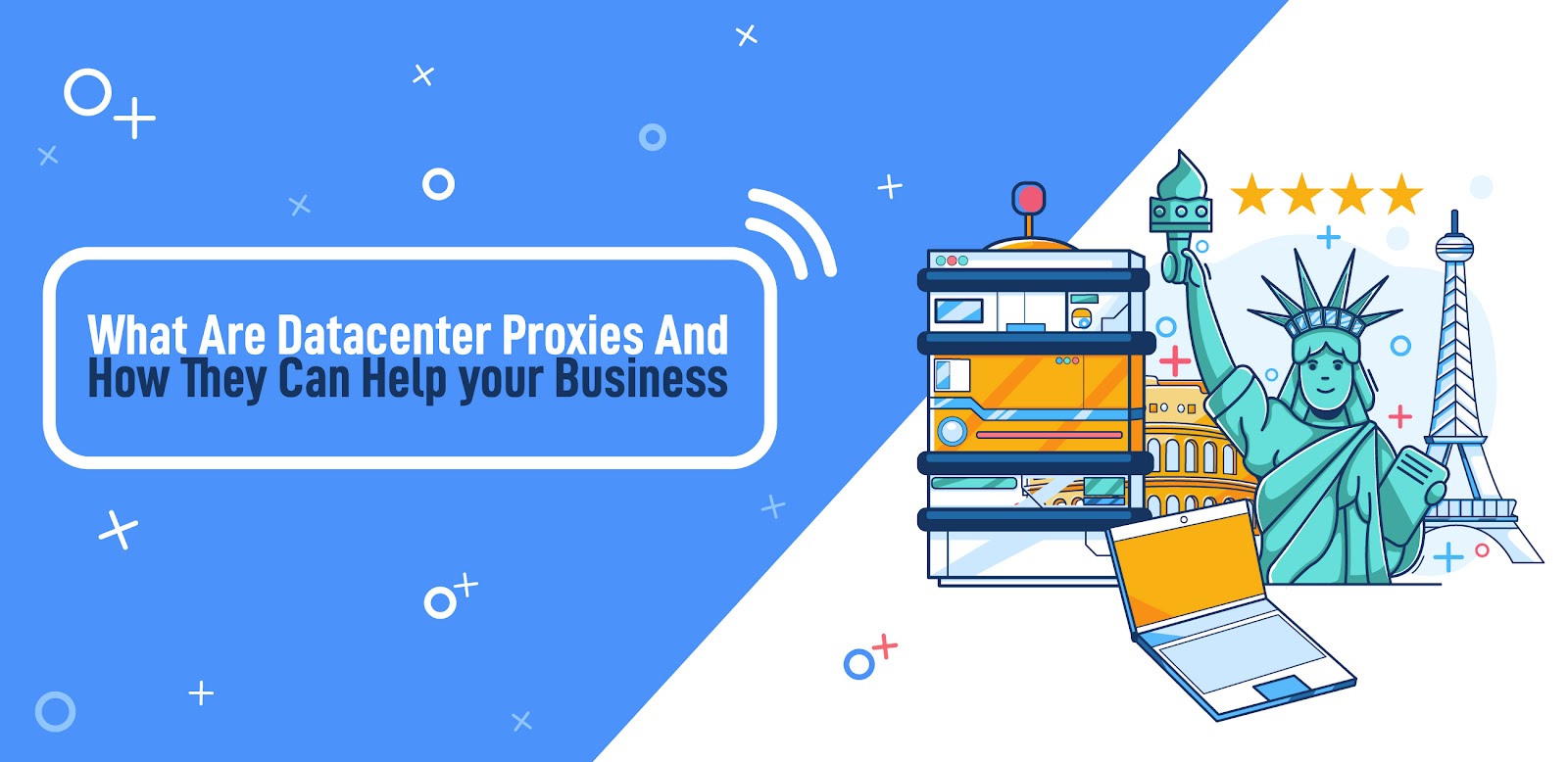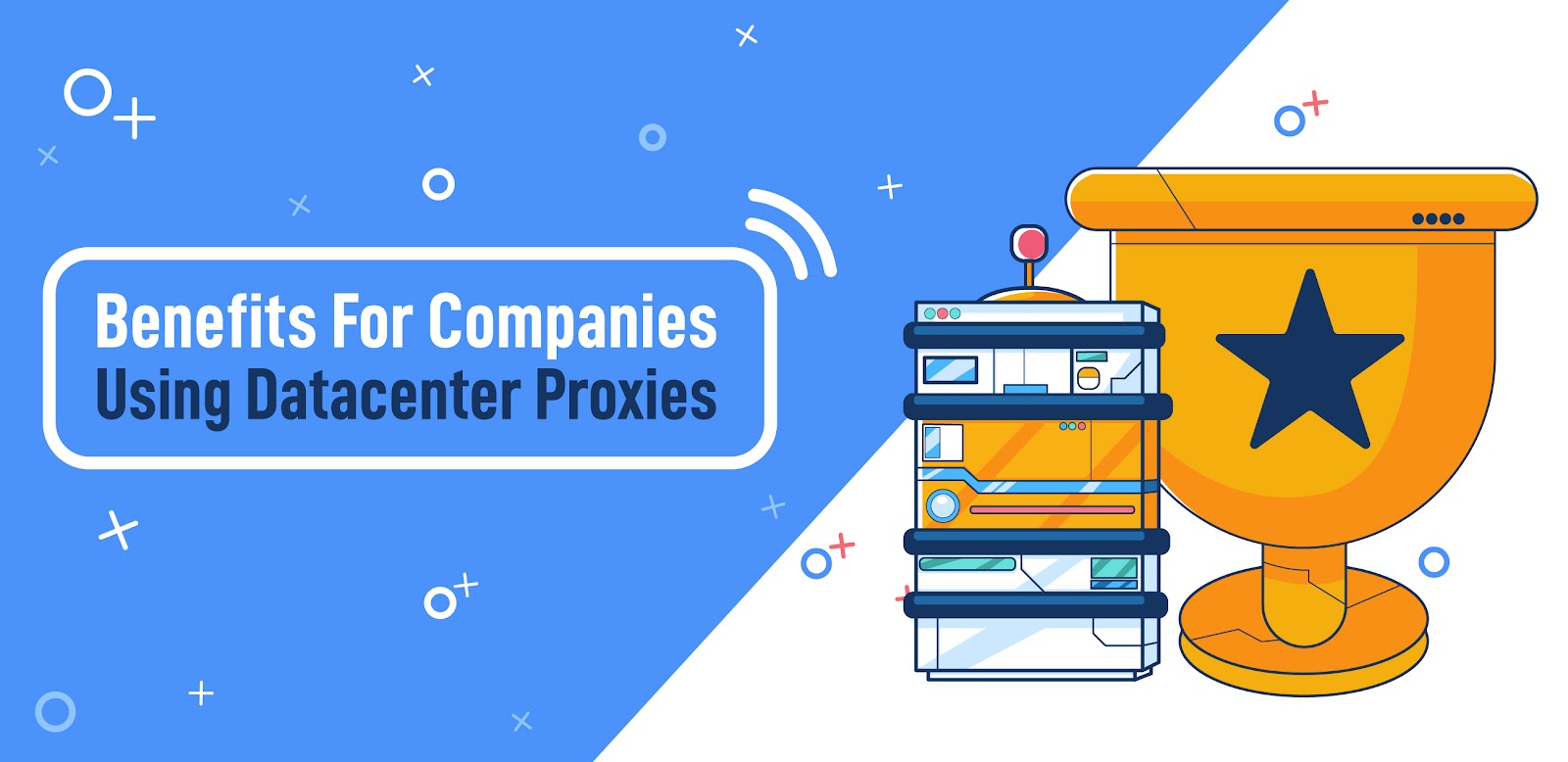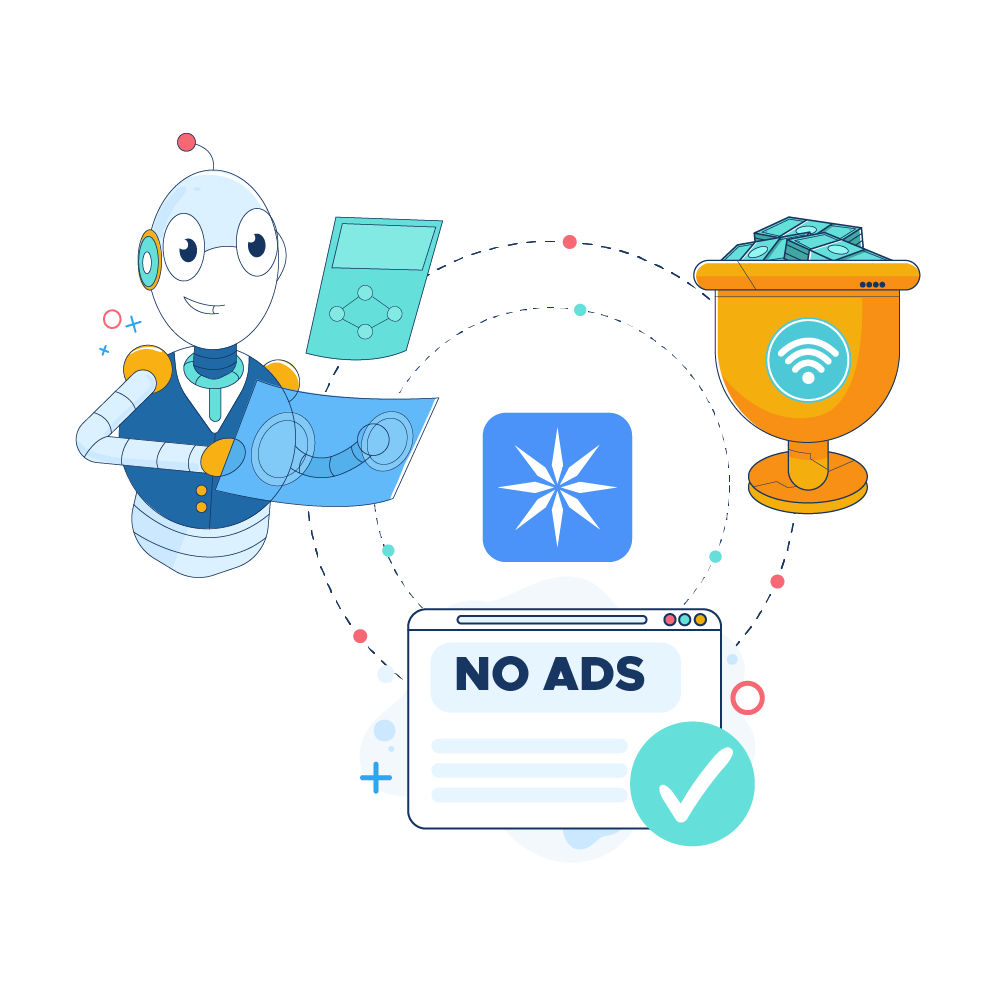ROTATING RESIDENTIAL PROXIES
Special Rotating Proxies
Rotating residential proxies with worldwide geo targeting optimized for high success rates.
Basic Rotating Proxies
Rotating residential proxies with random geo location.
Fast Rotating Proxies
Rotating residential proxies with worldwide geo targeting optimized for scraping and data gathering.
On Demand Proxies
Residential proxies with on demand rotation, geo targeting using user and password authentification.
What are Datacenter Proxies and How They Can Help your Business

Datacenter proxies have been preferred for many years in data extraction activities and companies or individuals that chose them for their projects had some good reasons to do so.
Since a proxy works as a middleman between the user and the virtual space, proxy servers can be employed for numerous business cases from simple data extraction tasks to more complex jobs.
What’s important to keep in mind is that users most of the time choose proxies to make sure their identities remain concealed so they can access online resources fast and without any technical issues.
That’s why, even though we now have a great number of proxy server solutions available, the most popular ‘weapons’ of choice in retrieving content remain the proxies delivered by data centers to local Internet Service Providers.
Since we already covered residential proxies in another dedicated article, our present endeavor is to offer an overview of datacenter proxies in an attempt to reveal that these popular data extraction tools are still relevant in today’s environment for many businesses.

What exactly are the data centers that provide these proxies?
Datacenter proxies are IP addresses that are provided by data centers located in various countries around the world.
Data centers have become quite popular over the last years for most web-based firms that want to benefit from the numerous advantages these data management locations can offer.
For instance, a business appealing to a data center can externalize its IT infrastructure and focus on building the main products and developing the marketing strategy.
As a data center offers companies the possibility to move most of their software applications ‘into the cloud’, these businesses can reduce the budget expenses for supporting large IT departments.
Furthermore, since the data center offers a business the possibility to move the website, applications, email, and storage facilities onto its servers, the business owners enjoy an increased level of security from both physical threats - fire, floods, quakes, etc. - and online menaces, such as malicious software.
Finally, besides moving the entire IT infrastructure to a secure location, the company benefits from better scalability in case the website or the application receives a great number of customers or visitors at the same time. You wouldn’t want your clients to encounter any delay while enjoying your services, of course.
To return to the datacenter proxies, we have to say that in a data center a server can deliver a great number of proxies that all share the same resources allowing users to benefit from increased performance and access speed.
In such an environment, we will find most of the time several types of datacenter proxies. We may have for instance proxies that are shared by more users or we can choose some that are private for increased speed and security. Of course, we will have different costs for these two types of datacenter proxies.
What are the downsides of datacenter proxies?
Datacenter proxies have been used for many years for data extraction jobs and they continue to be used with great success today. However, datacenter proxies are not perfect and they do come with several disadvantages for users who want to obtain valuable content from the Internet.
We mentioned earlier that since a datacenter server can provide a great number of proxies that share the same resources, users enjoy better speeds. And it’s quite true, but a major disadvantage emerges as the proxies look quite similar, an element which attracts unwanted attention from the visited web locations that may try to block any further access or simply blacklist the datacenter IPs.
This lack of trust in datacenter proxies is equally based on the fact that various individuals - more or less shady - used them to target online resources and withdraw private sensitive information from the online space.
As a result, major websites and companies that value online security invested in multiple protection barriers to keep unwanted ‘visitors’ away.
Though it’s not as easy nowadays to scrape any online location as in the past, for most data extraction jobs data center proxies remain some of the most popular web-based tools and are still very much used for the benefits they bring to companies from the online environment.
Benefits for companies using datacenter proxies

We’ve already mentioned that companies that require web content have multiple alternatives at hand. Some of the main tools are residential proxies that have been hailed by numerous parties as some of the best means to obtain online data.
In our specific case, the static residential proxies which originate from data centers and are delivered to residential Internet Service Providers are generally recognized for the impressive stability, endurance and speed offered for most scraping use cases.
Let’s see further why data center-based proxies continue to remain some of the most popular data extraction tools.
1. Datacenter proxies are stable
Since residential IPs offered by Internet Service Providers to local users depend on the availability and stability of their regional networks, these proxies may be reliable but they are not as stable and fast as the alternative offered by data center-based static proxies.
As a data center is equipped with massive hardware and software resources - no matter how many users access its servers - it will always be able to offer the necessary scalability and availability to individuals browsing online via its IP addresses.
2. Datacenter proxies offer the best performance
Data centers have been imagined to offer users not only great storage and connectivity solutions, but to deliver the best performance and scalability in the market for companies that want to build websites and applications which can receive thousands of customers.
At the same time, data centers - especially those from Amazon, Google or any other major corporation - have been designed to serve a great number of companies that rely on that IT infrastructure to provide excellent services.
Therefore, a data center already comes with the necessary resources and it’s no wonder to see that the proxies - and IP addresses - they deliver offer the best performance in the industry to many businesses.
3. Datacenter proxies are fast and furious
With some excellent in-built capabilities and resources at their disposal, data centers have no problem offering fast proxies for users who look to engage in data extraction activities.
Datacenter proxies are generally very much appreciated for managing to obtain the targeted content fast allowing any business to use the publicly obtained information for further product development and marketing campaigns.
Datacenter proxies offer higher speeds than any other alternative in the market for users who want to obtain the required data without losing time.
4. Proxies come at great prices
In addition to great stability, performance and speed, datacenter proxies also manage to come at great prices and are much cheaper to acquire than other data extraction tools.
Until now, datacenter proxies sound like a great deal for companies that are looking to attract the necessary content for developing their businesses.
Though all of the above benefits are real, for the sake of objectivity, we have to admit that data center-based IPs are less reliable than home network residential IPs and more prone to getting blocked in web scraping operations.
5. Datacenter proxies open geo-restricted doors
Datacenter proxies may not open more online doors than the home network-based alternatives, but they are still very much used to access public websites and extract valuable content for companies that need the required data.
Should you use datacenter proxies to access geo-restricted websites?
This is a normal question many companies raise when looking to use proxy server solutions for the first time. And the question makes sense as rotating proxies, even though more effective than the datacenter alternatives, can be found at higher prices.
Is it worth it to pay the price for rotating residential proxies?
Most of the time, this is a question you can reply to only when you have the necessary experience in working with proxies.
Usually, most companies try to obtain the necessary content by starting with data center-based static proxies to test the degree of success along the way.
To keep it simple, we need to say that you just have to test the proxies and analyze the successful attempts versus the number of times you get restricted from scraping a particular web source.
If your business growth depends on extracting valuable information from hard-to-scrape sources, you should consider rotating residential proxies and the home network IP addresses they offer.
6. Datacenter proxies offer increased privacy
Proxies are generally used to obtain online data for private and business purposes.
But that’s not all. Even though obtaining the targeted data is obviously important, users are equally looking to get the data without revealing any details about their true identities.
Is it important to extract data from your competitors and understand their business plans?
Yes, of course, these details matter in designing your own marketing and sales strategy, but all these elements would lose their appeal if competitors discovered that you’ve been scraping their websites for pricing details and SEO strategies.
At the same time, in case a targeted location acknowledges that you’ve been targeting them, you might receive in return a false set of data which would mess up your final data extraction results and conclusions.
Though datacenter proxies offer privacy for users, home network-based residential proxies seem to be better at this job. In this case, yet again, the user needs to test the proxies first before understanding their limits.
Conclusions
Datacenter proxies continue to remain some of the most popular data extraction tools on the Internet for companies that require valuable data for business development.
With datacenter proxies at work, users manage to obtain important information while preserving a high level of privacy and security.
At the same time, datacenter proxies are the best alternative in the market for companies that require the highest level of stability, performance and speed in content scraping activities.
Though users can appeal to other proxy tools when looking for a better level of privacy, for general extraction jobs datacenter proxies continue to remain the most popular tools one can use to obtain the required content fast and without breaking the bank.
This category's latest stories

4 Simple Reasons Businesses Love To Use Proxies
Businesses love proxies for many reasons. In this article, we focus on the most important benefits for SEO, social media, online sales, and pricing.

6 Myths About Proxy Server Solutions
Are you aware of all the myths that surround proxies? Let’s debunk the most popular myths about proxy server solutions. Check out our blog post!

Free vs Paid Proxies: Why You Should Always Pay For Proxies
Which is better to use for business: free vs paid proxies? Check our article to discover the main reasons you should always pay for proxies.
Featured Articles

News
02.12.2024
Introducing Ice Payments on Shifter
Discover seamless crypto transactions with Ice payments on Shifter. Streamline your proxy service purchases and unlock new opportunities with Ice integration.

Residential Proxies
04.04.2023
8 Myths About Proxies. What You Should Know?
Are you aware of all the myths and stories surrounding proxies? Check our article and test your knowledge of proxies’ true limits in the online environment.

News
03.21.2023
Looking for an Alternative to Pi Network? Why ice Network is the Perfect Solution
Find more about the tremendous advantages of the ice Network and mining ice coins, as many are starting to take notice, ultimately choosing to leave Pi Network to have access to better, more rewarding opportunities.
Shifter's legacy
Shifter was founded in 2012, as one of the first residential proxy providers, since then it has become one of the leading proxy networks in the world and it's used by more than 25.000 clients including Fortune 500 Companies. Users can connect from anywhere to access local data without any restriction, while preserving a high degree of privacy and security.